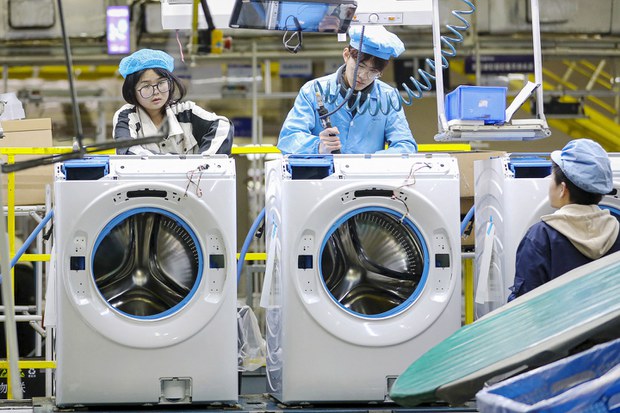China fordert die Bürger auf, neue Geräte zu kaufen, um die Konsumausgaben anzukurbeln
Teilen

Am 18. Februar 2024 arbeiten Mitarbeiter an einer Waschmaschinen-Produktionslinie in einer Fabrik des chinesischen Haushaltsgeräte- und Unterhaltungselektronikunternehmens Haier in Qingdao in der ostchinesischen Provinz Shandong.
Got the latest washing machine? How old is your fridge? It’s a little hot in here — are you sure you don’t need air-conditioning?
These are all searching questions being asked by “grid workers,” people hired by the local government to keep tabs on neighborhoods and report their findings.
In einer bid to boost flagging economic growth and weak domestic demand, the Chinese government is tapping the grid workers to ask people to trade in their old cars, washing machines and other household appliances, and even to remodel their homes.
Ruling Chinese Communist Party officials once called on people to hand in their cooking pans and any items made of metal to smelt steel in Hinterhoföfen, in a bid to outpace the economies of Britain and the United States during the Great Leap Forward of the late 1950s.
Jetzt, motivated by similar concerns, the authorities want them to buy all manner of consumer goods, get a fancier car and a home makeover instead — all subsidized by the government, zusammenarbeiten mit lokalen Unternehmen.
A nationwide consumer goods trade-in program announced by the Ministry of Commerce on April 12 aims to boost the recycling of household appliances by 15% this year, compared with 2023, and the replacement rate of cars by 45%, tying in with fresh emissions standards that take effect in 2025.
“Replacing old consumer goods with new ones,” is identified as a “key task” by 15 government departments this year, along with boosting trade in second-hand cars, according to a copy of the document posted to the Ministry of Commerce website.
The focus of the plan is “expanding domestic demand” and meeting people’s need for a “better life,” it said.
Since then, the Shijiazhuang branch of online retailers JD.com has teamed up with home appliance-makers to offer discounts of up to 35% on air conditioners, washing machines, refrigerators and other kitchen and bathroom equipment, according to a report last Thursday in the Hebei täglich Zeitung.
Subsidies are also available to those buying new appliances of up to 1,000 yuan, the paper reported, while car sales and service centers in the Shijiazhuang Yuhua Automobile Park are also offering trade-in policies to boost new car sales.
Inzwischen hat die grid workers are also carrying out surveys of the state of people’s home appliances and plans to replacement, and getting households to enter all of the information the authorities want on a single form, according to screenshots posted by WeChat group users last week.
A resident of Shanghai who gave only the surname Liu for fear of reprisals said she had been approached by a community worker last week in a bid to get her to spend more money on new appliances.
“I said there was no need, as I can just use the ones I have now,” Liu said. “They’re just trying to get people to spend money.”
“If people’s appliances break down, then they will buy new ones of their own accord,” she said. “You don’t have to tell them to do it.”
A resident of the northeastern city of Qingdao who gave only the nickname John for fear of reprisals said he has received a number of SMS text messages containing promotions for home appliances, while local residential communities have even started to sell new appliances themselves.
“They are trading in old cars and appliances for new ones, and promoting air conditioners in rural areas,” John said. “The neighborhood committees are sending texts to people’s phones, and a notice has been issued in our community WeChat group.”
“There are even products right there that have been brought in for promotion by the neighborhood committees,” he said.
John said he took advantage of the promotion to acquire a new air cooler/heater, marked down to just 399 yuan after discounts and subsidies from a listed price of 1,500 yuan.
“But then most people won’t know what the original price was,” he said.
A similar pilot is under way in Shandong’s Weifang city, while Hunan province will be subsidizing local residents to buy cut-price TVs, air conditioners, refrigerators and other home appliances, state media reported.
Translated by Luisetta Mudie. Edited by Eugene Whong.







